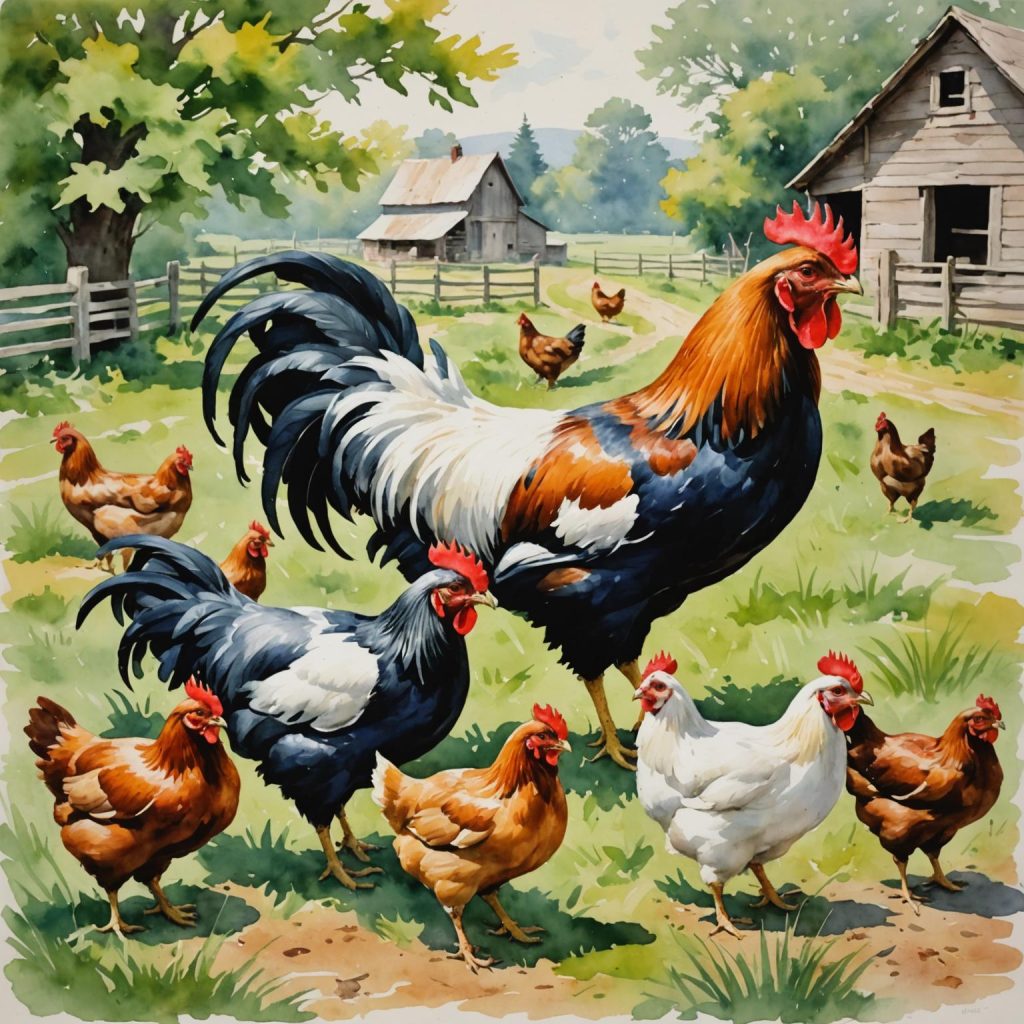Getting Started With Keeping Chickens: Your Guide To Happy Hens
Detail Author:
- Name : Mr. Bart Kling V
- Username : theresa27
- Email : labbott@hotmail.com
- Birthdate : 1998-10-25
- Address : 46026 Christiansen Fords Apt. 498 Beierside, IL 66833
- Phone : +1 (801) 590-2297
- Company : Legros, Raynor and Mitchell
- Job : Athletes and Sports Competitor
- Bio : Eligendi voluptatibus dolor eveniet. Sit quibusdam quo repellendus aut voluptates. Nam aspernatur voluptatem porro sequi. Deserunt deleniti maxime tempora reiciendis itaque voluptatum ea.
Socials
instagram:
- url : https://instagram.com/rosanna3933
- username : rosanna3933
- bio : Impedit qui id aliquam et ea laudantium ducimus. Earum quas est saepe necessitatibus.
- followers : 3795
- following : 2894
linkedin:
- url : https://linkedin.com/in/lindr
- username : lindr
- bio : Culpa et ea sint dicta.
- followers : 886
- following : 2314
tiktok:
- url : https://tiktok.com/@rosannalind
- username : rosannalind
- bio : Illo voluptatem et id alias cum.
- followers : 4258
- following : 937
twitter:
- url : https://twitter.com/rosanna1049
- username : rosanna1049
- bio : Et qui nemo sed eum ut debitis sint. Non adipisci quia nihil impedit. Maiores pariatur libero ullam illo ut. Nobis rerum consequuntur numquam qui.
- followers : 744
- following : 321
facebook:
- url : https://facebook.com/rosannalind
- username : rosannalind
- bio : Est doloribus ut et quod sapiente molestiae ut quibusdam.
- followers : 5901
- following : 580
Have you ever dreamed of gathering fresh eggs right from your own garden, maybe even watching a small flock of feathered friends peck around your yard? It’s a pretty appealing picture, isn’t it? For so many folks, the thought of keeping chickens brings a wonderful sense of self-sufficiency and a connection to something truly natural. It’s a hobby that, honestly, is gaining quite a bit of interest these days, and it's easy to see why, too.
The idea of having chickens in your care, really, means taking on a lovely responsibility. It’s about making sure these creatures are well looked after, kept safe, and given what they need to thrive. Just like a treasured family heirloom is in someone's keeping, your chickens will rely on you for their well-being. This guide, you know, aims to give you a clear path, helping you figure out if this delightful venture is right for you, and how to get going if it is.
This isn't just about getting eggs, though that's a big part of the appeal for many. It’s about the daily rhythm, the quiet clucking, and the simple joy these birds can bring. We’ve put together, pretty much, everything you might want to know about keeping chickens, from their food and shelter needs to daily chores, and even things like understanding different breeds or what costs you might expect.
Table of Contents
- Understanding What Keeping Chickens Means
- Is Keeping Chickens For You? A First Look
- Getting Ready for Your Flock: The Basics
- Daily Care and Routine Jobs
- Keeping Your Chickens Healthy and Safe
- Costs and Considerations
- Frequently Asked Questions About Keeping Chickens
- Your First Steps into Chicken Keeping
Understanding What Keeping Chickens Means
The very meaning of keeping, when we talk about chickens, is all about conformity and agreement. It's about how your actions align with what these animals need to thrive. If a flock is in your keeping, you are, quite simply, taking care of them. This means they are being carefully looked after, with their well-being as a top concern. It's a kind of harmony, a consistency in how you interact with them, you know.
Keeping refers to the act of maintaining or retaining something, or someone, in a proper or desired state. It involves taking care of, preserving, or looking after something or someone. This isn't just a simple task; it’s a commitment to providing a good life for your birds. It's about holding, guarding, maintaining, and supporting them. The Oxford Advanced Learner's Dictionary, actually, defines keeping as the act of retaining something, or the state of being in custody, care, control, or guardianship.
So, when we talk about keeping chickens, we're talking about taking on their custody, their care, their control, and their safekeeping. It's about their management and guardianship. It’s a trust you build with these creatures. Their actions, in a way, depend on your actions, and ensuring they are in keeping with their needs is what makes a good chicken owner.
Is Keeping Chickens For You? A First Look
Before you bring home those fluffy chicks, there are a few important steps to take. You need to be sure you are fully prepared to meet their needs and that your flock will stay happy, healthy, and safe. Raising backyard chickens can be a very fulfilling experience, bringing both joy and practicality to your life. My own experiences, growing up in a family that embraced gardening and, you know, a bit of backyard farming, showed me just how rewarding it can be.
Checking Local Rules and Regulations
First things first, before you even think about getting chickens, you really must make sure that keeping them is allowed in your town or city. Every place has its own rules, its own ordinances, and you need to understand what applies to your specific property. Some places might have limits on the number of birds, or even rules about roosters, so it's very important to check. You don't want to get started only to find out you can't, after all.
The Rewards of Having Chickens
If you're still not completely sold on the idea, consider this: there are some really good reasons to call chickens your own. We love our dogs, cats, and fish, but do they actually give us fresh eggs every day? Probably not! Having a constant supply of freshly laid eggs straight from your garden is, honestly, a huge perk. It’s a small step towards self-sufficiency, and the taste of a truly fresh egg is, like, incomparable.
Beyond the eggs, chickens are, you know, quite interesting to watch. They have their own little personalities, and their daily routines can be surprisingly entertaining. They also help with pest control in your garden and can turn kitchen scraps into something useful. It’s a practical hobby that offers a lot of charm and, in a way, a bit of peace.
Getting Ready for Your Flock: The Basics
Once you've decided that keeping chickens is for you, and you've checked all the local rules, it's time to get down to the practical side of things. Knowing how to begin is just as important as the decision itself. This is your beginner's guide, so you can start from scratch, so to speak.
Choosing the Right Breeds
There are so many different kinds of chickens, each with its own quirks and benefits. Some breeds are known for laying lots of eggs, others for their friendly personalities, and some are better suited to different climates. You might want to think about what you hope to get from your chickens. Do you want lots of brown eggs, or maybe some pretty blue ones? Do you need birds that are good with kids, or ones that can handle colder weather? Learn more about chicken breeds on our site to help you choose.
For a beginner, it’s usually a good idea to pick a hardy, docile breed that is known for being a good layer. Breeds like Rhode Island Reds, Plymouth Rocks, or Orpingtons are often recommended because they are pretty easy to care for and tend to be quite friendly. They are, you know, a good starting point for most people.
Setting Up Their Home: The Coop
Your chickens will need a safe, comfortable place to live, which is usually called a coop. This structure protects them from bad weather and from predators. It needs to have enough space for them to move around, roosting bars for them to sleep on, and nesting boxes where they can lay their eggs. A good coop also needs proper ventilation to keep the air fresh, but without drafts. Find out more about building the perfect chicken coop here.
When planning your coop, think about how easy it will be to clean. A coop that's simple to access for cleaning will make your life a lot easier, honestly. It also needs to be very secure. Predators like foxes, raccoons, and even neighborhood dogs are, sadly, always looking for an easy meal, so the coop must be built to keep them out, really.
What to Feed Your Flock
Chickens need a balanced diet to stay healthy and lay well. The main part of their diet will be a commercially prepared chicken feed, which comes in different forms like crumbles or pellets. Laying hens need a feed that's specifically formulated for layers, with enough calcium for strong eggshells. You can also offer them treats, like kitchen scraps (vegetables, fruits, cooked pasta), but these should only make up a small portion of their diet, perhaps 10% or so.
Grit is also very important. Chickens don't have teeth, so they swallow small stones to help them grind their food in their gizzard. You'll need to provide a source of insoluble grit, especially if they don't have access to a lot of dirt or gravel. Oyster shell, too, is often given separately to laying hens as an extra calcium boost for their eggs.
Daily Care and Routine Jobs
Keeping chickens doesn't require a huge amount of time or experience, but they do need consistent care. Like all animals, they still need consideration and attention. Following a few simple steps will help you soon be collecting eggs from your own happy hens.
Water and Food: Always Available
This is, perhaps, the most important daily task. Chickens need constant access to fresh, clean water. In hot weather, they will drink a lot, so you might need to refill their waterers multiple times a day. Their food feeders should also be kept full, making sure they always have enough to eat. Check on these things first thing in the morning and again in the evening, you know.
Egg Collection: A Daily Treat
Most hens will lay an egg every day or every other day, depending on the breed and the time of year. Collecting eggs daily helps keep them clean and prevents them from getting broken or eaten by the chickens themselves. It's, honestly, one of the most satisfying parts of chicken keeping.
Keeping Things Clean
A clean coop is a healthy coop. You'll need to do daily spot cleaning, removing droppings and wet bedding from the coop and nesting boxes. A deeper clean, where you remove all the bedding and replace it with fresh material, should be done regularly, perhaps once a week or every couple of weeks, depending on the size of your flock and coop. This really helps keep down odors and prevents the build-up of parasites.
Keeping Your Chickens Healthy and Safe
Chickens are fairly easy to look after, but they can be a bit confusing and stubborn at times. Understanding their quirks and needs will help you keep them healthy and prevent early losses, especially for beginner chicken owners.
Watching for Trouble Signs
Regularly observe your chickens. A healthy chicken is active, alert, and has bright eyes. Changes in behavior, such as lethargy, ruffled feathers, or a lack of appetite, can be signs that something is wrong. Knowing what's normal for your flock helps you spot issues quickly. Early detection, you know, often makes a big difference in their recovery.
Protecting from Pests and Predators
Predators are a constant concern for backyard chickens. Your coop needs to be secure, with sturdy wire mesh that predators can't chew through or squeeze past. Buried wire can prevent digging predators. Inside the coop, mites and lice can be an issue. Regular cleaning and dust baths for your chickens can help manage these tiny pests. Sometimes, you might need to use specific treatments, too.
Chickens are also, sadly, highly susceptible to avian flu. A few precautions can keep them and their humans safe. Keeping wild birds away from your flock's food and water, maintaining good hygiene, and isolating any new birds before introducing them to the main flock are very important steps.
Staying Cool in the Heat
In warmer climates, heat stress can be a real danger for chickens. Learn how to spot the signs – panting, wings held out from their bodies, lethargy. Providing plenty of shade, cool water, and even frozen treats can help them stay comfortable. Some people even put ice bottles in their waterers on very hot days, which, you know, can make a big difference.
Costs and Considerations
From the initial investment in a chicken coop to the ongoing costs of feed, bedding, and healthcare, keeping chickens does require a bit more than just time and effort. The initial setup can be the most expensive part, especially if you're building a coop from scratch or buying a pre-made one. You'll also need feeders, waterers, and of course, the chicks themselves.
Ongoing costs mainly involve feed, which can vary depending on the number of chickens you have and the type of feed you choose. Bedding material, like pine shavings or straw, will also be a regular expense. While chickens are generally hardy, there might be occasional veterinary costs if one of your birds gets sick. These tips help keep chickens healthy and prevent early losses for beginner chicken owners, but it's good to be ready for potential expenses, too.
Frequently Asked Questions About Keeping Chickens
Is it hard to keep chickens?
Not really, no. Chickens are actually fairly easy to look after, especially compared to some other animals. They need consistent care, like daily food and water, and a clean place to live. The most important thing is setting up their home properly from the start and understanding their basic needs. Once you get into a routine, it becomes, like, second nature.
What do chickens need to be happy?
Happy chickens need a few key things: a safe, secure, and clean coop with roosting bars and nesting boxes; constant access to fresh water and a balanced diet of chicken feed; space to scratch around and forage, whether in a run or free-ranging; and protection from predators and extreme weather. They also enjoy dust baths, which are, you know, essential for their feather health.
How much does it cost to keep chickens?
The initial costs for keeping chickens can vary quite a bit, depending on if you build or buy a coop, and how many birds you start with. This includes the coop, feeders, waterers, and the chicks themselves. After that, the ongoing costs are mostly for feed and bedding. These are generally pretty modest for a small backyard flock, especially when you consider the fresh eggs you get in return. For more general information on poultry care, you might find resources like those from a reputable poultry care organization helpful.
Your First Steps into Chicken Keeping
Raising backyard chickens can be a very fulfilling experience, drawing from a long tradition of people embracing this kind of practical hobby. It brings both joy and a sense of purpose. If you're new to this, this guide really aims to give you a solid foundation.
The complete guide to raising chickens is perfect for beginners, explaining things like food, healthcare, hygiene, and the different breeds for meat and laying eggs. It's about getting everything you need to know to care for your hens. So, you know, take the plunge and start your own flock. You might just find it's one of the best decisions you make for your home and garden.


